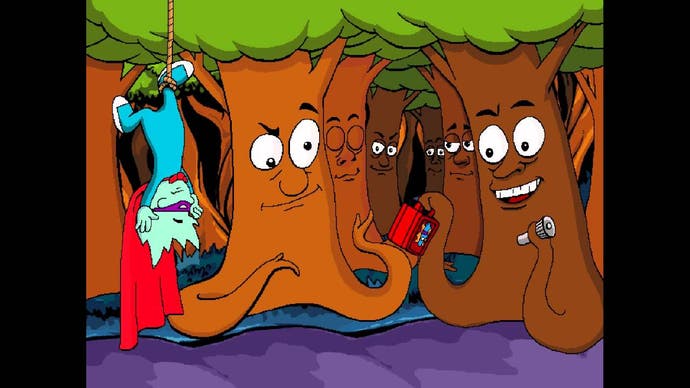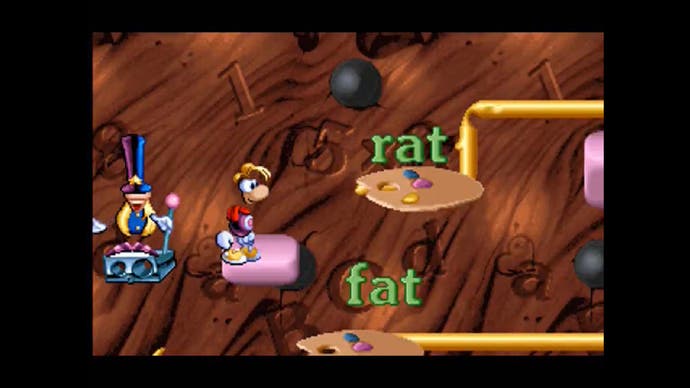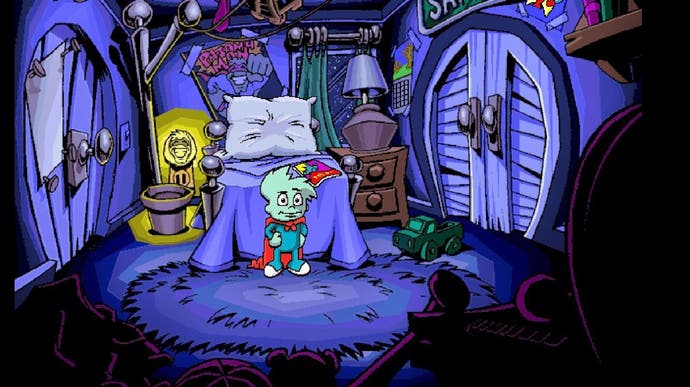Ron Gilbert's forgotten edutainment games
Guybrush Threepwood, meet Pajama Sam.
Ron Gilbert. We all know the name. Monkey Island, Maniac Mansion. Most recently, Thimbleweed Park. But, did you know that in the late 90s he made nearly 50 experimental Edutainment games in the SCUMM engine?
I was particularly well acquainted. This is because Humongous Entertainment was my gateway to the world of video games. As a three-year-old, my dad cranked up the office chair and sat me in front of our huge CRT monitor, offering me something that would instantly draw my eye away from The Lion King Activity Center: Pajama Sam.
In "No Need To Hide When It's Dark Outside," you play as the titular Sam, a young boy who mitigates his fear of the unknown via a superhero persona. For someone prone to night terrors (I would often wake my parents up to allege that the pirates from Rayman 2 were coming to get me) this was particularly effective.
My dad, an adventure games evangelist who cut his teeth on games like The Secret of Monkey Island and Zak McKraken, saw this to be the antidote for the invaders in my own glade of dreams.

Sam guides the player through a point-and-click adventure in The Land of Darkness, but not before a smidge of preparation. The first puzzle finds you scouring your bedroom for your Portable Bad Guy Containment Unit (Lunchbox), the Illuminator Mark 5 Jr (Flashlight), and of course your signature disguise. Telltale founder Dave Grossman's deeply imaginative and thoughtful writing immediately becomes apparent as you progress.
A charming game about the power of empathy, Sam fights his way through the terrors of the land, your main checkpoints being the reassurance of forlorn friends. The ultimate example of this is the physical representation of Darkness, the Oogie-Boogie-esque antagonist who, when confronted by Sam, reveals that he is just lonely up in his treehouse of terror and wants a friend to play board games with. Silly, yes, but through the trivialization of the most common childhood fear, this was a compelling ending note that made the gloomy corners of my childhood bedroom a bit more approachable.
No Need To Hide When It's Dark Outside spawned three sequels, and as it blossomed so did Humongous' other flagship series. Freddie Fish, Spy Fox and Putt-Putt all received follow-ups and used absurd humour to teach children important morals all the way through the late 90s and into the early noughties.
Interestingly enough, the team also hid some dark secrets in unused code. Some of the scenes left in included Pajama Sam using the toilet if you held the correct keys, Freddi Fish being brutally eaten by an eel and adorable anthropomorphic car Putt-Putt vomiting, his puppy partner Pep lapping it up with glee.
This isn't so shocking when you consider the general tone of the humour. It's confidently Pixar, meaning the gags aren't solely just for kids, with clever in-jokes and references layered on without too much on-the-nose dissonance. Ever popular adventure game 'moon logic' is also present, meaning that if you were to dive back in, you're still likely to get stuck at some point. Even the puzzles are randomized everytime you play, ensuring they still stand the test of time.

Reflecting on this unique pocket of gaming history some 20 years later, it shocks me how far the genre has fallen. Sure, point-and-click adventure games have unfortunately become a precarious gambit, but I'm referring to the wider concept of edutainment.
Thanks to the resounding pop of the internet bubble, the founders fled the scene and Humongous Entertainment faltered in the mid-2000s, eventually filing for bankruptcy in 2009. The last we heard of them was in 2014 when System Shock 3 developers Night Dive Studios rescued 28 of its games for modern digital platforms Steam and GOG.
Outside of hands-on eureka moments like Nintendo Labo and matter-of-fact mobile learning apps without any inspired design, it seems that no mainstream developer wants to apply its expertise to the genre of Edutainment like Ron Gilbert and the Lucasarts alumni did many moons ago. It was a truly selfless act, as their clear skill could have led to them doing literally anything else.
I'm not asking for Kidz Bop Bloodborne here, but a change in perspective on a genre that has fallen by the wayside. If Humongous Entertainment taught the world anything, it's that games for kids don't have to be uninspired or lifeless cash-ins. In fact, they can be hilarious, inspired works of art that are still palatable for those outside of its core demographic.
It's easy to forget that in 1996 Ubisoft had developed Rayman Junior, a proprietary version of the PlayStation classic that taught kids basic mathematics and literacy through platforming fun. So why not now?
A study from the NPD Group found that 91 per cent of children in the US aged 2-17 play video games, up 13 per cent from 2009. In the UK, a Statista survey found that kids aged 3-11 spend an average of 7 hours a week playing video games. Clearly, the demographic has been growing, but there aren't any popular properties out there willing to take the plunge.

Instead, the most popular IPs among children are Roblox and Fortnite, and of course, we can't forget YouTube, the ultimate panacea to sate those born into the era of tablets. Go to any parent-facing restaurant in the country and you'll find a brightly coloured device in front of a child, playing whatever nursery rhyme Little Baby Bum has animated this week. Some may find this epidemic concerning, but mostly it makes me think that we should long for an edutainment revival for the most impressionable members of our society.
If it wasn't for Humongous and Pajama Sam, my lifelong interest in video games would have never been piqued. As well as helping me sleep soundly, the clever quips and silly capers lit up my grey matter and led me to delve into the back catalogue of its designers. In it, I found adventure games, a genre that has made me feel an array of emotional extremes over the years. They taught me that video games can be more than just playthings, and most importantly, inspired me to forge a career writing about why.
There's clearly a gap in the market here. More than ever, budding gamers need a variety of accessible, positive paths into the medium that play to its best strengths, and an edutainment renaissance that taps into the diverse talent of this industry's finest minds could lead to some uncompromising games that are equally memorable decades down the line.

